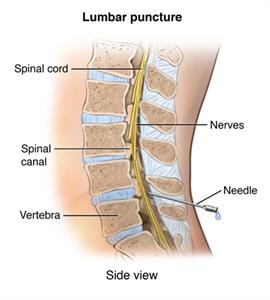Bacterial Meningitis
What is bacterial meningitis?
Meningitis is an infection of the membranes (meninges) that protect the spinal cord and brain. When the membranes become infected, they swell and press on the spinal cord or brain. This can cause life-threatening problems. Meningitis symptoms strike suddenly and get worse quickly.
What causes bacterial meningitis?
Bacteria or a virus can cause meningitis. Viral meningitis is more common. But bacterial meningitis is often more serious. It can lead to brain damage, seizures, paralysis, or stroke. In some cases, it can be fatal.
Many different types of bacteria can cause meningitis. For this reason, it's important to know what's causing it. Even though all types affect the same area of the body, they can have different outcomes and need different treatments. Vaccines are available that target many of these bacteria.
Who is at risk for bacterial meningitis?
Experts don't always know why meningitis happens. Some people get it when their immune system is weak or they've recently been sick. A head injury may also increase risk.
Bacterial meningitis is more common in infants younger than age 1 and people ages 16 to 21. College students living in dorms or other close quarters are at increased risk. Also at risk are adults with certain medical problems. These include those without a spleen. Or those taking certain medicines to suppress the immune system.
What are the symptoms of bacterial meningitis?
The most common symptoms of bacterial meningitis are:
-
Painful, stiff neck with limited range of motion.
-
Headaches.
-
High fever.
-
Feeling confused or sleepy.
-
Bruising easily all over the body.
-
A rash on the skin.
-
Sensitivity to light.
The symptoms to look for in children are:
Symptoms typically come on quickly. This can happen in as little as a couple of hours or up to a day or two. If you think you or your child may have meningitis, go to an emergency room right away.
How is bacterial meningitis diagnosed?
To diagnose this condition, a doctor will do a spinal tap (lumbar puncture). They take a sample of fluid from around the spinal cord. The fluid is then tested for bacteria. The doctor will also ask about your symptoms and do a physical exam.

Other tests may include:
How is bacterial meningitis treated?
Quick treatment of bacterial meningitis is crucial. It can save your life. Antibiotics that can treat a broad range of bacteria are given right away. The antibiotics can be changed once the specific bacteria is found.
Antibiotics are given through a needle placed into a vein (usually in the arm or hand). They may also be given along with a corticosteroid to help reduce inflammation and swelling. Treatment also includes plenty of fluids to prevent dehydration.
What are possible complications of bacterial meningitis?
With quick treatment, many people with bacterial meningitis don’t have any lasting problems. But even with quick treatment, some people may have seizures, brain damage, hearing loss, and disability for the rest of their lives. Meningitis can be fatal and some people with this infection may die.
What can you do to prevent bacterial meningitis?
Vaccines are available to help prevent certain forms of bacterial meningitis. Children now routinely get a meningitis vaccine around ages 11 to 12. A booster shot is given at age 16. Ask your doctor if you or your children should be vaccinated.
Bacterial meningitis is contagious. You can catch it from others. Ask your doctor how to keep from getting sick if you've been around someone who has it.
Key points about bacterial meningitis
-
If you feel like you've got the flu with unusual stiffness in your neck, fever, and headache, it could be meningitis.
-
Get any symptoms checked out and treated as soon as possible. This will help ward off problems.
-
Ask your doctor about vaccines that may protect you from bacterial meningitis.
-
Ask your doctor how to keep from getting sick if you've been around someone who has bacterial meningitis.
Next steps
Tips to help you get the most from a visit to your doctor:
-
Know the reason for your visit and what you want to happen.
-
Before your visit, write down questions you want answered.
-
Bring someone with you to help you ask questions and remember what your doctor tells you.
-
At the visit, write down the name of a new diagnosis and any new medicines, treatments, or tests. Also write down any new instructions your doctor gives you.
-
Know why a new medicine or treatment is prescribed, and how it will help you. Also know what the side effects are and when they should be reported.
-
Ask if your condition can be treated in other ways.
-
Know why a test or procedure is recommended and what the results could mean.
-
Know what to expect if you do not take the medicine or have the test or procedure.
-
If you have a follow-up appointment, write down the date, time, and purpose for that visit.
-
Know how you can contact your doctor if you have questions, especially after office hours or on weekends.